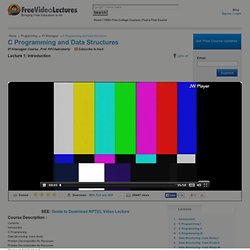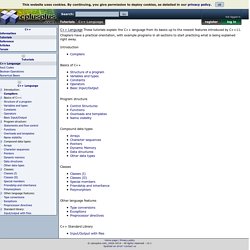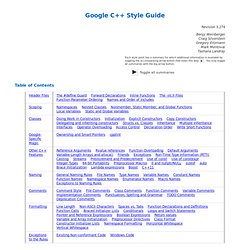

Programming with a personality, from start to finish. Introduction to Spring.NET. Programming in C++ C Programming and Data Structures Course, IIT Kharagpur Programming Video Tutorials, P.P.Chakraborty. SEE: Guide to Download NPTEL Video Lecture Course Description : Contents: Introduction C Programming Data Structuring: Case Study Problem Decomposition By Recursion Problem Decomposition By Recursion Merge sort And Quick sort Characters And Strings Arrays: Addresses And Contents Structures Dynamic Allocation Linked Lists Complexity (Efficiency) of Algorithms Asymptotic Growth Functions Asymptotic Analysis of Algorithms Data Structuring Search Trees 2-3 Trees Algorithm Design Graphs Conclusions Other Resources : Citation | Other Programming Courses » check out the complete list of Programming Video lectures Respected Sir,These Courses are very useful to the students to enhance their subject knowledge and also useful to the teaching staff to enhance their subject presentation skills.It's a boon to the student community as well as parents who opt for Quality Education.

Reply message added successfully. Respected Sir, Its golden chance for me for utilizing this type of facilities. C++ Programming Course, Other Programming Video Tutorials, C# Programming Guide. AIX Compilers. C++ Language Tutorial. This website uses cookies.

By continuing, you give permission to deploy cookies, as detailed in our privacy policy. ok Search: Not logged in C++ Language These tutorials explain the C++ language from its basics up to the newest features introduced by C++11. Introduction Compilers. Game From Scratch C++ Edition! Want to create a game using C++ and SFML?

This is the perfect place to start! This tutorial series will follow the creation of a simple game in C++ from the very beginning till the end, a micro-version of the overall purpose of this site. C++ is an evolving language standard and a great many tutorials out there are horrifically outdated or just plain bad. C++/C++0x/C++11 reference - cppreference.com. Google C++ Style Guide. Definition: Streams are a replacement for printf() and scanf().

Pros: With streams, you do not need to know the type of the object you are printing. You do not have problems with format strings not matching the argument list. (Though with gcc, you do not have that problem with printf either.) Streams have automatic constructors and destructors that open and close the relevant files. Cons: Streams make it difficult to do functionality like pread(). Decision: Do not use streams, except where required by a logging interface. There are various pros and cons to using streams, but in this case, as in many other cases, consistency trumps the debate. Extended Discussion There has been debate on this issue, so this explains the reasoning in greater depth. Proponents of streams have argued that streams are the obvious choice of the two, but the issue is not actually so clear.
Cout << this; // Prints the address cout << *this; // Prints the contents.